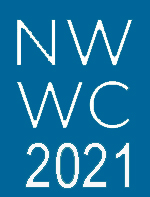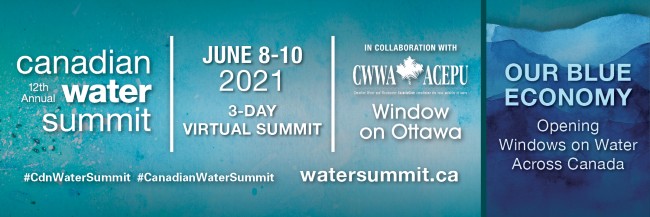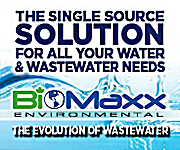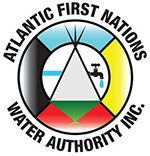 |
||||||||||||||||||||||||||
| Subscribe | Past Issues | www.cwwa.ca | Water Source Magazine | ||||||||||||||||||||||||||
|
CWWA News
I have had a truly inspiring month in which I joined a number of online water events for young professionals across Canada. I spoke at a Career Day webinar for students of all things water-related at Queens University. Then I did the same for a night at Western University. Both events were inspiring for me to see the enthusiasm from these students and a true desire to make a difference. I was also recruited as a so-called ‘expert’ for the Western Canada AquaHacking Competition. I joined an “Ask Me Anything” session and was excited to see so many applicants for the competition. Meanwhile, I continue as an advisor to the IWA’s Young Professional Committee in Canada as they prepare for their national online event this June.
The federal government has committed to establishing a new Canada Water Agency to coordinate national efforts to protect Canada’s great water resources. The first step was to prepare a Discussion Paper – Towards the Creation of a Canada Water Agency. They then began a public consultation process that has included a series of national and regional webinars and virtual workshops. The discussion paper can be seen on our cwwa.ca website here.
Federal Initiatives
Last month, Public Safety (PS) Canada announced that it is making available a new Canadian Cyber Security Tool (CCST) specifically designed to help Canadian Critical Infrastructure owners and operators obtain an overview of their organization’s operational resilience and cyber security posture, as well as comparative results across their sector. The importance of these tools was highlighted by the recent incident in Florida’s Pinellas County, when a hacker tried to boost sodium hydroxide levels at the plant to 11,100 ppm. Had this succeeded it could have caused skin damage or very severe gastrointestinal symptoms. This Private Member’s Bill would amend the Fisheries Act in order to entirely prohibit the deposit of raw sewage in water. While the Bill is alarming to our members it is important to note that Private Member Bills rarely pass. On March 6, 2021, the Minister of Health gave notice that a guidance document on the microbiological aspects of drinking water quality has been posted on the Water Quality. The document integrates the relevant microbiological considerations found in the various documents developed as part of the “source-to-tap” approach used in the Guidelines for Canadian Drinking Water Quality (GCDWQ). The overview also summarizes 21 other guidelines that have an impact on microbiological water quality. Environment and Climate Change Canada (ECCC) is seeking your input on amendments to the Wastewater Systems Effluent Regulations, in particular on transitional and temporary authorizations. Water Canada Bernadette Jordan—minister of fisheries, oceans and the Canadian Coast Guard—is inviting all Canadians to provide input on the federal government’s Blue Economy Strategy. A Blue Economy Strategy will enable the Government of Canada to protect and revitalize the health of our oceans while taking advantage of emerging economic growth opportunities throughout ocean sectors.
As much as we’ve tried to stay connected and to share information ‘virtually’, nothing can replace the value of really being together. Video chat rooms are not the same as seeing old friends and networking with your colleagues. By November, it will be almost 2 years since we’ve gathered as professionals…and friends. Window on Ottawa is CWWA's signature event focused on federal water policy. It is a unique event where you learn about everything you ever wanted to know about water at the federal level…and were afraid to ask. The most senior national policymakers from each federal department and agency are invited to the event—not to tell us what they’ve already released, but to tell us what they’re working on now and what is coming next. The Window on Ottawa is a fascinating forum to engage with these policymakers at a very early stage and leave with an understanding of what to expect as a water leader. CWWA will continue its collaboration with Water Canada in 2021. In conjunction with the Canadian Water Summit, sessions of the Window on Ottawa will be taking place on June 8-10, 2021 in Ottawa, Ontario. Member News
Provincial News
Filed January 29, 2021, the amendment, under the Electricity Act, adds various products to Schedules listed under the regulation, including prescribed: commercial pre-rinse spray valves; oil-fired furnaces; portable air conditioners; air compressors; and products designed to ensure an uninterrupted power supply. Snippings & Clippings
ESE Magazine To fight stormwater runoff that can cause erosion and flooding in waterways while degrading water quality and aquatic habitats, the City of Ottawa is considering a pilot project to encourage homeowners to manage stormwater on their properties. Reuters A river has won legal rights for the first time in Canadian history, in a move hailed by environmentalists as a new way to protect nature from humans. Windsor Star University of Windsor researchers have received more than $1 million to collect data and lay the groundwork for establishing an early-warning system to protect water treatment systems in Southwestern Ontario and potentially around the globe. Water Canada Assembly of First Nations (AFN) National Chief Perry Bellegarde says urgent action is required to end long-term boil water advisories and achieve water certainty in First Nations. This call for action follows the release of a report by the Office of the Auditor General of Canada evaluating water-related commitments made by the federal government. FCW The federal government's leading cybersecurity agency said a potentially lethal breach of a Florida water treatment plant last month was caused by two factors: a desktop sharing application being widely used due to the coronavirus pandemic and an outdated operating system no longer receiving security updates. The close call is now prompting lawmakers to question what entities govern cybersecurity at water utilities and what changes must be made before a future attack succeeds in harming the public. Water Canada The cost of water risks to business could be over five times greater than the cost of taking action now to address those risks, according to a new report by CDP. The report, A Wave of Change, finds that the companies disclosing through CDP’s water security questionnaire in 2020 risk losing up to a combined US$301 billion in business value if they do not address water risks. It’s also estimated that the total cost of addressing these risks is US$55 billion—less than one fifth of the amount. Duluth News Tribune The city of Bemidji and 3M came to an agreement for the company to pay the city $12.5 million to support operations at a new water treatment plant. The facility will remove chemicals, produced by 3M, from the city's water wells. Bay Journal After Hurricane Sandy mauled the Atlantic Coast in October of 2012, scientists and conservationists have been working to “strengthen” the shoreline and make it more resilient in the face of major storms. The Hurricane Sandy Coastal Resilience Program, led by the U.S. Fish and Wildlife Service, involves countless federal and state agencies, as well as local and regional conservation groups. Water Canada AECOM and Graham Construction have successfully completed the design-build work on the first wastewater treatment plant in Victoria, British Columbia. The McLoughlin Point Wastewater Treatment Plant provides tertiary treatment for wastewater from Victoria, Esquimalt, Saanich, Oak Bay, View Royal, Langford, Colwood, Esquimalt Nation, and Songhees. IWA Source Microplastics are spread throughout the environment, yet we still know little about them. Keith Hayward reviews some of the current thinking and concerns, and the need for progress on monitoring and analysis. There is growing concern about microplastics, driven not least by ever-mounting evidence of just how pervasive they are. Last year, for example, the World Health Organization (WHO) presented a review of findings on microplastics in freshwater and drinking water. It summed up the situation by stating: “Microplastics are ubiquitous in the environment.” Adirondack Explorer During a stretch of unusually warm weather and calm water last fall, a pair of algal blooms appeared on famously pristine Lake George. The blooms were the first documented harmful “algae” or cyanobacteria outbreaks on the lake, and they’ve raised urgent questions about whether state officials are doing enough to keep pollution out of the lake. In theory, Lake George should be among the most protected in the country. DCist They’re known as “forever chemicals,” because they linger in the environment and our bodies … forever. And new testing by the Environmental Working Group found the cancer-causing chemicals to be present in drinking water in Northern Virginia at higher levels than elsewhere in the D.C. region — and among the highest in the United States. CBC Water treatment operators in Coronach, Sask., had an unwelcome surprise Monday morning when they found the town's water treatment plant had been broken into overnight. This meant the water reservoirs that serve the 650-person town may have been contaminated. The Saskatchewan Water Security Agency has put the town under a 'do not use' advisory. This means the tap water in Coronach should not be used for anything — not drinking, not showers, not even if it's boiled — until the advisory is lifted. ProPublica On Feb. 16, less than two weeks after a mysterious attacker made headlines around the world by hacking a water treatment plant in Oldsmar, Florida, and nearly generating a mass poisoning, the city’s mayor declared victory Winnipeg Free Press For large numbers of people to live together, cities need systems to handle power, water, transportation, communication, and waste. Historically, these systems were built with concrete and steel. Roads, bridges, power lines, cell towers, and sewer pipes are all part of a city’s grey infrastructure. CWWA Member Profiles
The Atlantic First Nations Water Authority (AFNWA) represents progress, innovation, and a long-term solution for water and wastewater problems that affect Atlantic First Nations communities. Once operational, this pan-Atlantic Utility will provide a common standard for water & wastewater treatment along with improved management and increased resources to deal with long standing water challenges faced by Atlantic First Nations. |
||||||||||||||||||||||||||






